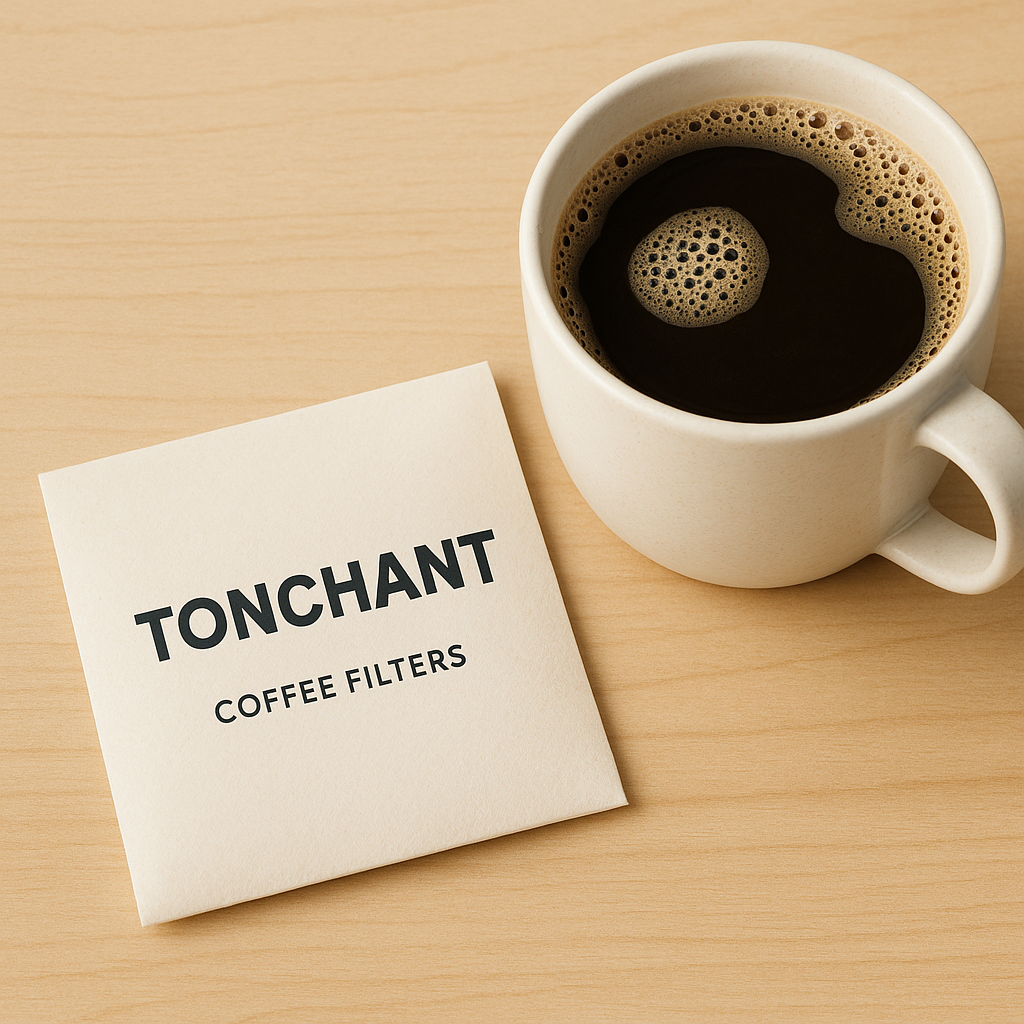For roasters, cafés, and specialty retailers looking to expand their brand into accessories or offer a branded brewing experience, launching a private-label coffee filter line is a smart move. Done well, private-label filters can enhance quality, deepen customer loyalty, and create new revenue streams. The challenge lies in finding a reliable supplier who strikes a balance between performance, compliance, and design, and who doesn’t impose prohibitive minimum order quantities. The following is a practical guide to sourcing private-label coffee filters, based on Tonchant’s proven approach to filter production and customization.
First define your product goals
First, be clear. Decide on the filter type (tapered, flat-bottom, Kalita, or drip), the target brew style (clean and crisp, full-bodied, or neutral), and whether the product should be bleached. Also, set sustainability goals: compostable, recyclable, or conventional. These decisions dictate the paper grade, basis weight, and fiber blend, and determine cost and delivery time.
Understand important technical specifications
Ask suppliers for exact numbers, not vague statements. Key specifications include basis weight (g/m²), porosity or Gurley number, wet tensile strength, and filtration efficiency. These predict coffee flow rate, tear resistance, and how much fines the paper captures—all of which affect coffee quality. Reputable manufacturers will provide lab data and actual brewing test results to support their specifications.
Start with samples and blind brewing
Never buy coffee beans without seeing the full product line. Order sample packs of different grades—light, medium, and full-bodied—and brew comparisons using your standard recipe. When tasting, pay attention to extraction balance, clarity, and any papery notes. Tonchant, for example, offers sample packs so roasters can evaluate their performance before printing and packaging.
Check minimums, printing options, and design support
If you’re a small bakery, minimum order quantities may impact your business. Look for a facility that offers low-volume digital printing and private label services. Tonchant supports private label orders with a minimum order of 500 packs, using digital printing for smaller runs and flexographic printing for larger batches. Also, confirm that the supplier provides prepress support, color proofs, and plate files—high-quality designs can help speed approvals and reduce expensive reprints.
Verifying food safety and sustainability credentials
If your filters come into contact with hot water and brewed coffee, be sure to provide food contact safety documentation. If you plan to promote sustainability claims, request ISO 22000 or equivalent food safety documentation, as well as any relevant compostability or recyclability certificates. Tonchant adheres to food-grade production standards and can provide compliance documentation to streamline market approvals.
Checking production quality control
The quality of your filters depends on a repeatable manufacturing process. Ask potential suppliers about in-line inspections and batch testing: Do they measure the air permeability of your batches, perform wet tensile tests, and visually inspect the consistency of pleats and die-cuts? Suppliers that use real-world brewing trials as part of their quality control will reduce the risk of post-market surprises.
Confirm packaging and labeling options
Determine whether the filters will be shipped loose in boxes, boxed by quantity, or nested in retail packaging. Consider adding a branded box or insert with brewing instructions to enhance perceived value. Ensure your supplier can print batch codes, roasting dates, and regulatory documentation in your target language. If you plan to ship internationally, ensure your packaging meets your market’s customs and retail display requirements.
Plan delivery times, pricing, and logistics
Consider production lead times and shipping times. Digital short-run printing is generally faster than flexo lines, but costs more per unit. Request tiered pricing to understand how unit costs decrease as production increases. Also, clarify shipping terms (EXW, FOB, DAP) and any warehousing or dropshipping services the supplier offers to support e-commerce fulfillment.
Negotiating pathways to trial and scale-up
Start with a small commercial test run to test customer response and shelf turnover. If sales meet expectations, a clear roadmap for scaling should be established: minimum requirements, color consistency, and the number of print runs should be determined upfront. A good supplier will offer a roadmap from prototype to full-scale flexo production, including guaranteed lead times to accommodate seasonal demand.
Build post-sales support into the agreement
Ask about post-sales support: sample replacements, promotional short-run reprints, and renewal options for seasonal SKUs. Tonchant’s service model encompasses prototyping, low-volume digital printing, and larger flexo scale-ups—useful for brands looking to iterate without stretching their supply chain.
Useful shopping list
• Define filter styles, paper grades, and sustainability goals.
• Required technical specifications: basis weight, breathability, wet tensile strength.
• Order graded sample packs and conduct blind brew tests.
• Confirm minimum order quantity, printing options and artwork support.
• Verify food safety and compostability/recyclability certificates.
• Review supplier quality control processes and lot traceability.
• Agree on delivery time, packaging method and shipping terms.
• Start small and scale with clear pricing tiers and production roadmap.
Private-label filters are more than just packaging; they’re an extension of your brand and a part of your coffee-brewing ritual. Choosing the right manufacturing partner can make the difference between a memorable accessory and a product that enhances your reputation. Tonchant offers low-MOQ private-label options, technical testing, and design support, helping roasters and cafés quickly bring trusted, well-designed filters to market.
If you’re ready to explore private label, request a sample kit and custom quote. The right filter can reinforce your brand proposition—quality, consistency, and a great cup of coffee every time.
Post time: Aug-25-2025
